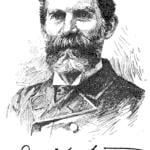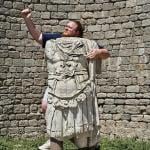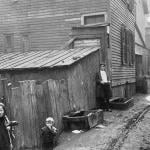No, this is not about American politics: the Emergent movement, in many of its local shapes and variations, often (though not uniform) will have a sense that the Church is a body and that it only functions best when it is thoroughly democratic, and that term means “governed by the people.” In more theological terms, the movement tends to be congregational and it is low church.
This is emphatic at Solomon’s Porch and it won’t surprise to learn that it embodies this in the “architecture” where it gathers: there is no stage; the meeting is in the round; there are no clear designations between the “pastor” and the “laity.” And the latter terms would not be entirely appropriate. They want to see one another’s faces instead of the backs of people’s heads, so they create a room in the round. Instead of using a “concert/theater” theme for the physics of their gathering with its stadium seating or pews, they choose couches. What Solomon’s Porch wants is for “church” gatherings to be “normal.” Dress, seating, everything is to evoke the way we really are.
Here’s the point of it all: “it’s important that the roles people play not be confused with power” (52) — even if I might wink at Doug Pagitt for resorting here to a “theater” metaphor in speaking of “roles.” Power can be connected to public voice, especially when that voice is magnified. (I recall a friend who was aghast at Willow Creek when he saw the figure of the speaker blown into mega-size by the concert screens, and he found it nearly impossible to see it as idolatrous. Having become used to such a use of media, I found myself temporarily stunned by his being stunned.) Power is an issue in the Emergent movement, and it is against it.
I can’t confirm or reject his observation that by making the gathering place “normal,” there is established an easier connection between talking about the kingdom of God and living in our world. “Instead of having a special place, unlike any other, where we try to make the things of God seem normal, we have tried to create a normal place that gives us permission to discuss the unique things of God” (53). This is (almost) Chestertonian in rhetoric and (even more closely) Anabaptist in theology.
In true postmodernist spirit, Doug Pagitt’s comments are set within the journal of a “Dustin,” who on these pages says this: “Church without Doug is a lot like when Valerie left on that old sitcom “Valerie’s Family”…. Doug is our Valerie. Each week he is gone brings us one step closer to syndication” (53). Try as hard as one’s might enables, and you will always end up with those who are gifted being needed by those who need the exercise of those gifts. This doesn’t necessarily make for hierarchicalism, but it does establish a biblical sense of the Church: where leaders lead. The dangers of hierarchicalism are ever present, and only constant vigilance, such as one finds at Solomon’s Porch and in many other Emergent churches, can prevent leaders from taking over the whole show. I’m Anabaptist, and so I think the effort must be made. I see Solomon’s Porch as one more attempt by Christians to do what they can to avoid the hierarchy the Reformation so worried itself over.
Because there is an anti-hierarchy strain to the Emergent movement, and “strain” might seem to some to be too gentle a term, there is correlative: democratic church structures encourage, even if they struggle to achieve, genuine dialogue between all participants. Clearly, Solomon’s Porch achieves more dialogue than most. The single-most observable feature of dialogue for Solomon’s Porch is that Doug Pagitt meets with a group Bible study on one night in the week and sees that as the center of his sermon study time. I’ve been trained, yea I’ve trained others, in the opposite tradition: namely, with pastors tucked away in some study for prayer and Bible study and thoughtful reflection as the center of sermon preparation time. So, when I read this, I have to take a step back. My initial response was “not surprising” and “consistent with a pure low church ecclesiology,” but the third thought came after these two and chased them down with this: “but, Doug, what about giftedness?”
But, because I am committed to a low church and democratic and congregational and Spirit-led sense of ecclesiology, I must confess there is something to what Solomon’s Porch is doing. It would be good for all preachers, I say to myself, to listen to how his or her congregation “hears” Scripture and to listen when such persons are reading the Bible and discussing its implications for daily living. And to do so without saying a word so as not to interrupt the flow. I’m wondering if others have tried this and if it genuinely is of value to the “preacher.”
All of this about democracy and dialogue to say this: deep in the heart of Solomon’s Porch is a belief that the Church is the Body of Christ, that 1 Corinthians 11–14 is the heart of how the church works, and that is time to remind ourselves, once again, that “lay” people are gifted and when that giftedness is thoroughly implemented, the wall between “pastor” and “laity” is thinner than thin. And when this happens in tune with the Spirit of God, the Church is the best witness God has left on earth to his transforming grace.










